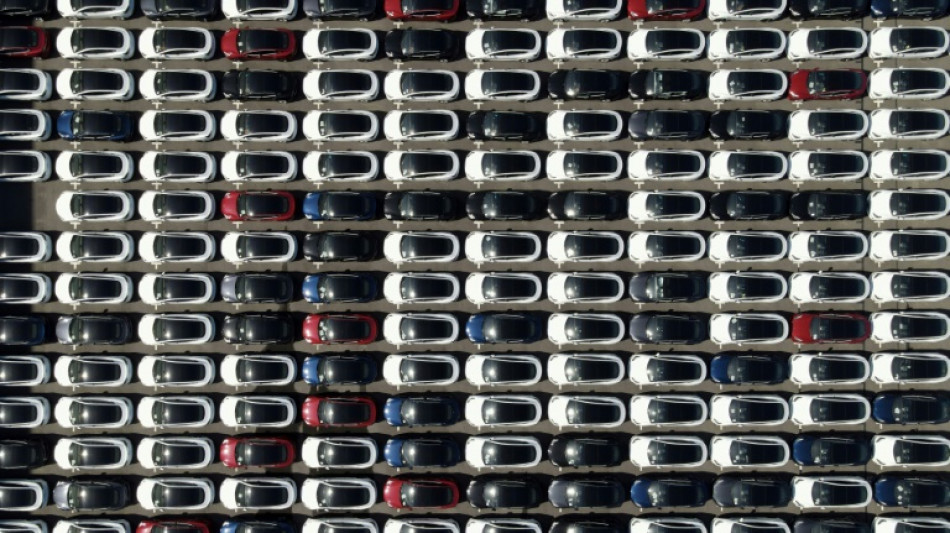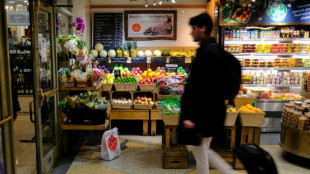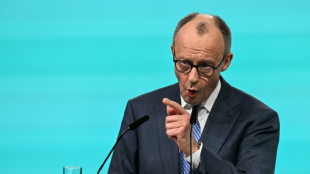
-
 Scotland captain Tuipulotu grateful for Wales boss Tandy's influence
Scotland captain Tuipulotu grateful for Wales boss Tandy's influence
-
Zelensky says no 'family day' in rare personal interview to AFP

-
 Zelensky tells AFP that Ukraine is not losing the war
Zelensky tells AFP that Ukraine is not losing the war
-
Sweden to play Switzerland in Olympic women's curling final

-
 Counting the cost: Minnesota reels after anti-migrant 'occupation'
Counting the cost: Minnesota reels after anti-migrant 'occupation'
-
UK police probe Andrew's protection as royals reel from ex-prince's arrest

-
 Doris says Ireland must pile pressure on England rising star Pollock
Doris says Ireland must pile pressure on England rising star Pollock
-
US military assets in the Middle East

-
 Neymar hints at possible retirement after World Cup
Neymar hints at possible retirement after World Cup
-
Stocks rise after court ruling against US tariffs

-
 Australia end dismal T20 World Cup by thrashing Oman
Australia end dismal T20 World Cup by thrashing Oman
-
Olympics chief says Milan-Cortina has set new path for Games

-
 Russian SVR spy agency took over Wagner 'influence' ops in Africa: report
Russian SVR spy agency took over Wagner 'influence' ops in Africa: report
-
Pegula fights back to sink Anisimova and reach Dubai final

-
 Trump administration denounces 'terrorism' in France after activist's killing
Trump administration denounces 'terrorism' in France after activist's killing
-
Colombia's Medellin builds mega-prison inspired by El Salvador's CECOT

-
 German broadcaster recalls correspondent over AI-generated images
German broadcaster recalls correspondent over AI-generated images
-
US Supreme Court strikes down swath of Trump global tariffs

-
 England's Itoje says managing 'emotional turmoil' key to 100 cap landmark
England's Itoje says managing 'emotional turmoil' key to 100 cap landmark
-
Trump says weighing strike on Iran as Tehran says draft deal coming soon

-
 Tudor is '100 percent' certain of saving Spurs from relegation
Tudor is '100 percent' certain of saving Spurs from relegation
-
Azam dropped for scoring too slowly, says Pakistan coach Hesson

-
 Stocks volatile after soft US growth data, court ruling against tariffs
Stocks volatile after soft US growth data, court ruling against tariffs
-
Italy bring back Capuozzo for France Six Nations trip

-
 From Malinin's collapse to Liu's triumph: Top Olympic figure skating moments
From Malinin's collapse to Liu's triumph: Top Olympic figure skating moments
-
Arteta urges Arsenal to 'write own destiny' after title wobble

-
 Ukraine Paralympics team to boycott opening ceremony over Russian flag decision
Ukraine Paralympics team to boycott opening ceremony over Russian flag decision
-
Wales captain Lake wants fans to bring 'noise' against Scotland

-
 Skier Vonn's Italian hospital a hotbed of men, sister says
Skier Vonn's Italian hospital a hotbed of men, sister says
-
India target S.Africa top order, Abhishek to come good: bowling coach

-
 Carrick praises Man Utd 'diversity' after Ratcliffe's immigrant rant
Carrick praises Man Utd 'diversity' after Ratcliffe's immigrant rant
-
I never thought it would be hit, says 'Scream' creator 30 years later

-
 AI summit statement delayed to 'maximise' signatories: India
AI summit statement delayed to 'maximise' signatories: India
-
Barcelona's Sagrada Familia basilica hits peak height

-
 Milan sprints to second straight UAE stage win as Tiberi keeps lead
Milan sprints to second straight UAE stage win as Tiberi keeps lead
-
US GDP growth misses expectations as Trump blames shutdown

-
 Benfica investigate video of fans' monkey gestures
Benfica investigate video of fans' monkey gestures
-
French minister pledges tight security at rally for killed activist

-
 Guardiola 'couldn't care less' about Arsenal stumble in title race
Guardiola 'couldn't care less' about Arsenal stumble in title race
-
UK police search property as royals reel from Andrew's arrest

-
 Germany's Merz to visit China next week
Germany's Merz to visit China next week
-
Kompany says Mourinho made 'huge mistake' in Vinicius racism row

-
 X appeals EU's 120-mn-euro fine over digital content violations
X appeals EU's 120-mn-euro fine over digital content violations
-
Galthie recalls hulking locks Flament, Meafou for Italy

-
 Turkey, Saudi sign major solar power deal
Turkey, Saudi sign major solar power deal
-
US Olympic freeskier Hess embraces 'loser' tag after Trump blast

-
 European stocks rebound, oil prices ease after US-Iran volatility
European stocks rebound, oil prices ease after US-Iran volatility
-
'Alpha male' AI world shuts out women: computing prof Hall

-
 New Zealand freestyle skier Ives in hard Olympic crash
New Zealand freestyle skier Ives in hard Olympic crash
-
New Zealand must adapt quickly to Sri Lanka wickets: Chapman


Policy levers that can push decarbonisation into overdrive
Government measures to boost electric vehicle sales, the share of green ammonia in fertiliser, and public purchasing of plant proteins could help shift the decarbonisation of the global economy into high gear, researchers said Friday.
Strategic support through regulation and subsidies in these three areas would have knock-on effects, accelerating the transition away from planet-warming fossil fuels across nearly a dozen high-emitting sectors, they said in a report released as business and political leaders meet at the World Economic Forum in Davos.
"We need to find and trigger positive economic tipping points if we are to limit the risk from damaging climate tipping points," said University of Exeter professor Tim Lenton, one of the first scientists to quantify the danger of such thresholds in Earth's climate system.
A world two degrees Celsius warmer than preindustrial levels, for example, could push the melting of polar ice sheets past a point of no return, resulting in many metres of sea level rise.
Other climate change tipping points could see the Amazon basin turn from tropical forest to savannah, and billions of tonnes of carbon leech from Siberia's permafrost into the atmosphere.
In a mirror image, economic tipping points are small interventions that can drive large positive effects in society.
"This non-linear way of thinking about the climate problem gives plausible ground for hope," said Lenton, co-lead author of the report, "The Breakthrough Effect: How to Trigger a Cascade of Tipping Points to Accelerate the Net Zero Transition".
"The more that gets invested in socioeconomic transformations, the faster it will unfold," he said.
- 'Super leverage points' -
A decade ago, for example, electric vehicles barely registered in terms of market share and a rapid phase-out of the internal combustion engine seemed highly improbably.
But a mix of subsidies and deadlines for phasing out the sale of new combustion-engine vehicles had catapulted the EV revolution into overdrive far more quickly than even boosters had expected.
France, Spain, California and other countries or states have banned the sale of new combustion engine cars and vans starting in 2035, and the European Union is well on its way to doing the same.
"By rapidly increasing the production of batteries, prompting technological and cost improvements, electric vehicles could support the transition to clean power and the decarbonisation of other sectors that need cheap and clean energy," the report said.
Mandates that require the use of green ammonia -- made from hydrogen using renewable energy -- to produce fertilisers could kick-start the hydrogen economy, the report found.
This would not only replace fossil fuels in fertiliser, but also bring down the costs of green hydrogen, paving the way to their use as fuels in shipping and steel production, two sectors where decarbonisation is especially difficult.
The third "super leverage point" assessed in the report is alternative sources of protein, especially plant-based, which are already cheaper than most meats.
Requiring their use in schools, hospitals and government offices could spark a more widespread shift towards non-meat protein sources, leading to reduced emissions from livestock and freeing up an estimated 400 to 800 million hectares (one to two billion acres) -- equivalent to seven to 15 percent of global agricultural land today.
This, in turn, would reduce incentives for deforestation and leave more land available to support biodiversity and carbon storage in trees and soil.
"High-emitting sectors of the economy do not exist in isolation, they are deeply inter-connected," said co-lead author Simon Sharpe, a senior fellow at the World Resources Institute in Washington.
Th.Berger--AMWN


